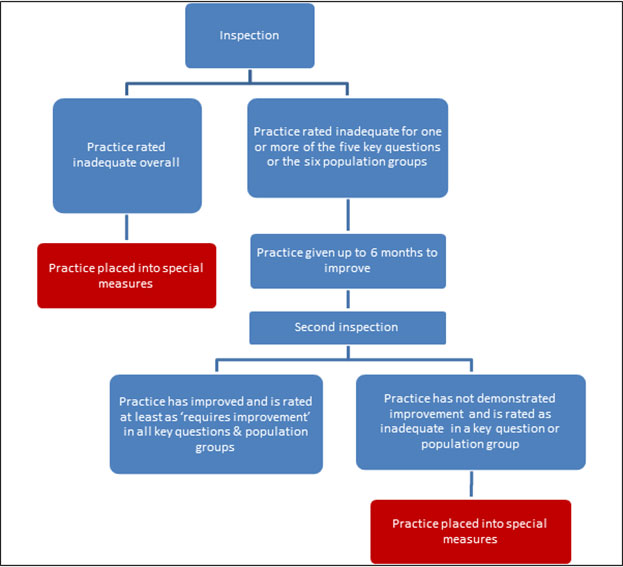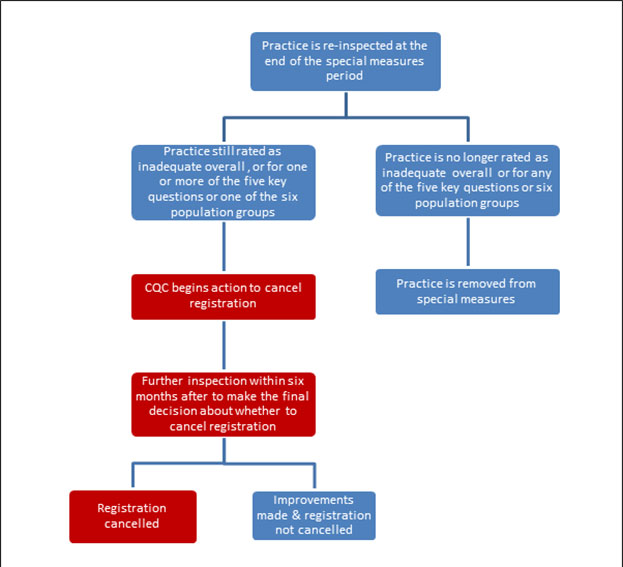In August 2014 we announced our plans to introduce a special measures framework for GP practices.
Special measures provides a framework within which CQC and NHS England will work together to ensure a timely and coordinated response to GP practices that are providing inadequate care. This will ensure that practices are not allowed to continue to provide inadequate care to patients indefinitely.
Since then we have been working closely with NHS England, GP practices and organisations that represent them, as well as people who use services, to develop this approach.
We have also been piloting this approach since October 2014, when we began inspecting and rating NHS GP practices on the basis of whether they are outstanding; good; requires improvement or inadequate.
As a result of this piloting and engagement we have amended our initial proposals. The amendment relates particularly to the criteria for a GP practice being put into special measures. We are therefore re-launching these proposals for some further engagement and piloting between now and April 2015, when we will fully implement our final approach to special measures.
What is the purpose of special measures?
The purpose of special measures is to:
- Ensure that providers found to be providing inadequate care do not continue to do so.
- Provide a framework within which we use our enforcement powers in response to inadequate care and work with, or signpost to, other organisations in the system to ensure improvements are made.
- Provide a clear timeframe within which providers must improve the quality of care they provide or we will seek to cancel their registration.
Proposed framework for special measures
In October 2014 CQC began inspecting and rating GP practices. They are rated for five key questions (safe, effective, caring, responsive and well-led) and for six population groups (older people; people with long term conditions; families, children and young people; working age people, including students and those recently retired; people whose circumstances may make them vulnerable; and people experiencing poor mental health, including dementia).
GP practices rated as inadequate for one or more of the five key questions or six population groups will be given a specified time period for re-inspection. This will be no later than six months after the initial rating is confirmed. This period will give the practice a fixed time during which they must demonstrate improvement, ahead of another CQC inspection.
If, after re-inspection, they have failed to make sufficient improvement, and are still rated inadequate for a key question or population group, CQC will place the practice into ‘special measures’.
In our initial proposals for special measures we said that in a very small number of cases, a GP practice will receive an inadequate rating, and will have such significant problems that patients are at risk, or there will be sufficiently little confidence in the GP practice’s capacity to improve on its own. In these cases we said that the practice will be placed straight into special measures. Following piloting and engagement with stakeholders, we acknowledge that we need to be clearer about when a GP practice will be placed straight into special measures following an initial inspection. As a result we are proposing that any GP practice receiving an inadequate rating overall will be placed straight into special measures.
We will usually place GP practices into special measures for six months. Being placed into special measures will represent a decision by CQC that a practice has to improve within six months to avoid us taking steps to cancel their registration.
If, at the end of the special measures period, the practice has not improved we will begin proceedings to cancel the provider’s registration. There will usually be a further final inspection within six months to consider whether to proceed to cancel the provider’s registration. If there have been no improvements we will cancel the provider’s registration. This will be subject to the usual representations process.
Special measures does not replace our existing enforcement powers and enforcement action can be taken at the same time, including urgent action to protect people who use services. It is likely that we will take enforcement action at the same time as placing a GP practice into special measures.
NHS England and the Royal College of General Practitioners are developing arrangements to provide support to GP practices that are placed in special measures. Further information on this can be found in NHS England guidance 'Framework for responding to CQC inspections of GP practices'.
Proposed flow diagram for entry into special measures

Note: Practices placed into special measures will be able to access support from their Area Team to help them improve.
Proposed flow diagram for exit from special measures

Note: Practices placed into special measures will be able to access support from their Area Team to help them improve.
Questions and answers
What is 'different' about special measures? Why are you introducing this now?
In October 2014 we began rating GP practices in England on a four point scale: outstanding, good, requires improvement, inadequate. A rating of inadequate will be an unambiguous signal that improvements are needed.
Placing a practice into special measures will be a clear sign that a practice needs to improve. And working with NHS England, we will introduce an approach that ensures that practices are not able to continue to provide inadequate care indefinitely: the approach will ensure that practices work quickly to improve the quality of care they provide.
Why will a practice be placed into special measures?
We have been piloting the criteria for being placed into special measures with GP practices that we have inspected from October 2014. We set out our initial proposals in August 2014 and have also sought some feedback on these from stakeholders and people working in general practice. In the proposals above we have amended the criteria for being put into special measures as a result of this piloting: we want to make it much clearer which practices will be placed straight into special measures.
CQC’s proposals are that GP practices receiving an overall inadequate rating following an inspection will be placed straight into special measures for a period of six months.
In other instances, where aspects of a service are rated ‘inadequate’ at an initial inspection, practices will have six months to improve. If they fail to demonstrate improvement at the next inspection they will be put into special measures for a period of six months.
If after being placed into special measures they are still found to be inadequate either overall, or for a key question or population group, we will begin action to cancel their registration.
What support will be provided to failing practices under the new regime?
NHS England has produced guidance on the support available to practices and how the Area Team and CCG will work with the practice during the special measures period.
NHS England is working with the Royal College of General Practitioners to develop a pilot programme of intensive support to practices that are placed in special measures.
When will special measures be introduced for NHS GP practices?
From October 2014, when we begin rating practices, we have been piloting special measures whilst working with the sector and NHS England to ensure that it is effective and appropriate.
We will fully implement our approach to special measures from April 2015. We will publish final guidance on special measures before April 2015.
What if the practice does not improve following special measures?
CQC will inspect the practice at the end of the special measures period. If the practice has not improved, and continues to provide inadequate care, CQC will move to cancel the provider's registration and issue a Notice of Proposal to cancel registration. There will usually be a further inspection within six months to consider whether to cancel the provider’s registration. This will be subject to the usual representations process.
This does not necessarily mean that the practice will close: it means that the existing provider can no longer provide the services at that practice. NHS England will ensure that patients registered at the practice are able to continue to access GP services.
Does CQC have new legal powers to put practices in special measures?
No. Special measures will be introduced using the existing powers that we have under the Health and Social Care Act 2008. We have a range of enforcement powers to protect people who use regulated services from harm and the risk of harm and to hold providers and individuals to account for failure in how the service is provided. It is likely that these enforcement powers will be used alongside placing a GP practice into special measures.
Find out more
Read our news story to find out about the introduction of special measures for GP practices.
Developing our approach
Between 15 January and 5 February 2015, we asked for your views on our proposals for special measures for GP practices.
We will update our special measures guidance and provider handbooks with our final approach, before formally rolling out our approach in April 2015.